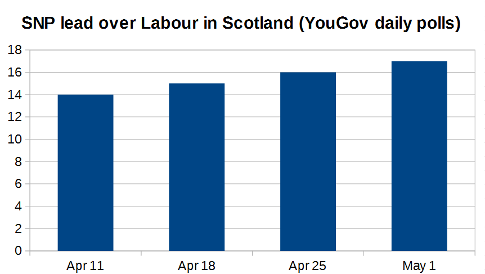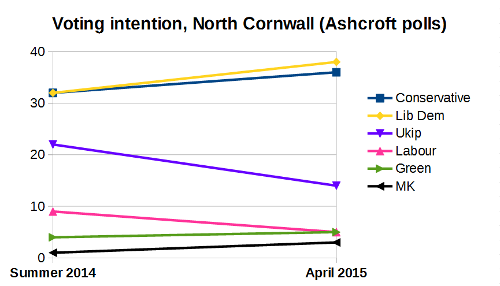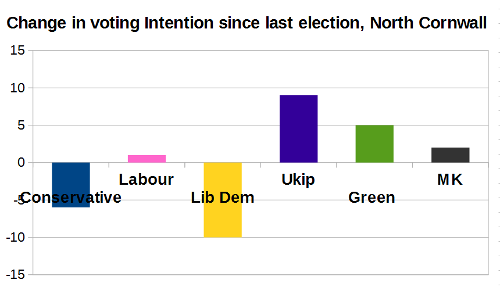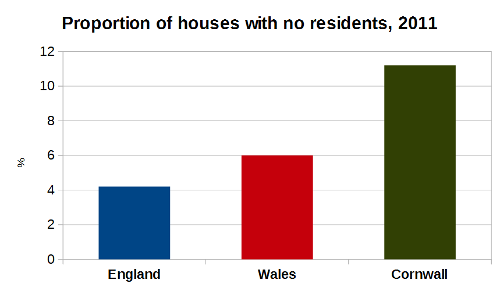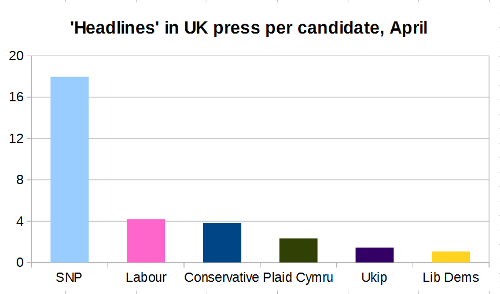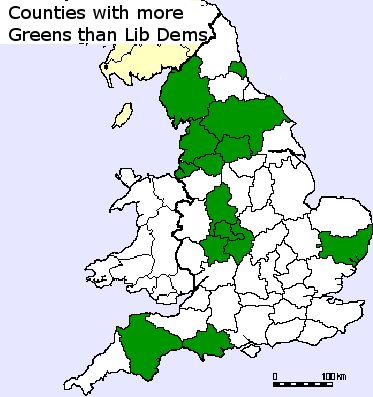Bernard Deacon's Blog, page 65
May 4, 2015
North Cornwall: Coalition to win
At last, this tedious charade nears its thankful denouement. Soon we’ll be spared the scaremongering, beancounting and ignoring the real issues we’ve had to endure for the last few months. Parliamentarians can then get back to the real business of making cuts and ensuring the most vulnerable pay to keep casino capitalism on the road. Let’s start the final constituency round-ups in the far north, Once upon a time, elections here were exciting as Liberals and Conservatives battled it out in a surrogate battle between church and chapel, booze and temperance, landlord and tenant, town and country. Now we only have the sorry spectacle of two coalition candidates vying for victory. Dan Rogerson and Scott Mann between them are, according to recent polls, attracting around three quarters of those who’ll bother to vote (although this is only half the registered electors in North Cornwall).
Rogerson doesn’t do social media but he’s quietly using the formidable local Lib Dem machine to corral the voters. Among his claims is credit for road improvements which will increase the capacity to continue the high population growth strategy that he seems to be so keen on. Although his majority may have slipped from 6% in 2010 to 2% in the most recent polls, those polls do suggest he’s been able to pick up more votes since last summer than Scott Mann, his Tory rival.
 Tory Scott Mann, all rugged and Poldark-like
Tory Scott Mann, all rugged and Poldark-likeTurning from Tweedledee to Tweedledum, we read that Mann’s being getting a ‘great response’ (don’t they always – when’s a candidate going to say ‘crap response in X today’?) in Bude and Marhamchurch, where people were terrified of the prospect of the SNP propping up a Labour Government. Why this phobia should make them more likely to vote Tory is a mystery, unless they’re equally scared of the prospect of Rogerson again propping up a Tory Government. Scott has a small problem as there are now fewer ghost second home voters to rely on here. So to make up for that loss, he’s been turning to visits from top Tories. Such as Grant Shapps, or is it Michael Green, which he unaccountably appears to believe is a vote winner. If one dodgy character wasn’t enough, George Osborne also popped down to assure Scott that he wouldn’t reinstate a pasty tax. Although he doesn’t need to as they haven’t actually got rid of the last one yet.
 Dan Rogerson – more pasty-like
Dan Rogerson – more pasty-likeJulie Lingard has watched support for Ukip steadily drift away since last summer, when for an instant Ukip looked to be picking up around a quarter of the vote in North Cornwall. It’s now down to the general GB average and an entirely more reasonable level as Ukip’s flock wanders dozily back to graze greedily on Tory and Lib Dem promises. Julie’s been busy publicising Ukip policies, such as tougher penalties for animal cruelty, which wouldn’t have been so welcome news for a previous Ukip candidate further west. She’s also been having throwbacks to the days when candidates had election meetings rather than hustings, holding a series of local meetings around the constituency. What next? Heckling? The open ballot?
It’s likely that John Whitby for Labour and Amanda Pennington of the Greens will be fighting it out for fourth place and the honour of saving their deposits. They’re presently neck and neck in the polls, although Amanda has the dubious advantage of an endorsement from Kernow King. While the King is going for MK in the rest of Cornwall, his attention was captured by Amanda’s energetic campaign (and her red hair.) When it comes to social media she’s way out in front, with 57 facebook posts last week alone, engaging 2,300 people. However, somewhat sadly, a video of her campaign which appeared in the Telegraph, paints a picture of a one-women campaign strapped for cash, with few posters and with only one leaflet to hand out. Are there no other Green Party members in North Cornwall?
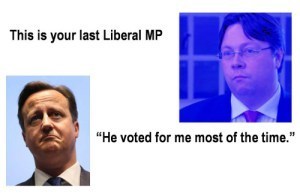 Labour’s John Whitby is also quite active on social media, although nowhere near as frenetic or compelling as Amanda. He’s been providing an admirable public service however, by informing voters of Dan Rogerson’s voting record. He’s also been holding street parties in Bodmin, Bude and Wadebridge, accompanied by a blues singer. Unfortunately, no-one seems to come to them though. Looks like fun, but may not win that many votes.
Labour’s John Whitby is also quite active on social media, although nowhere near as frenetic or compelling as Amanda. He’s been providing an admirable public service however, by informing voters of Dan Rogerson’s voting record. He’s also been holding street parties in Bodmin, Bude and Wadebridge, accompanied by a blues singer. Unfortunately, no-one seems to come to them though. Looks like fun, but may not win that many votes.
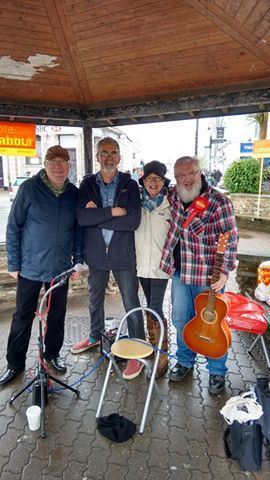 Not a voter in sight in wet Wadebridge
Not a voter in sight in wet WadebridgeFinally, we have Jeff Jefferies for MK, a last minute candidate who thinks that Cornwall was ‘effectively self-governing until the 1750s’ and is therefore out-doing even Ukip in the nostalgia stakes, let alone the wishful-thinking zone. Then there’s an even more last minute candidate – John Allman from Lanson – who’s standing because every child needs a father. (Don’t ask me; I don’t know either.)
Without the second home voters, North Cornwall may be safer for Rogerson than it appears. Nonetheless, Scott Mann’s impeccable local roots will do him no harm. I can’t believe that last time around I called for a vote for Rogerson here in order to keep a particularly obnoxious pro-tourist lobby Tory out. How stupid was that? I must have been young and naive. I’m now older, more bitter, cynical and twisted. If this goes on, by 2020 I’ll be a Ukip voter. So this time anyone but Rogerson (oh, but not Mann, Lingard or Allman please).
Here’s my prediction for the seat …
1. Rogerson (LD)
39%
2. Mann (Con)
37%
3. Lingard (Ukip)
14%
4. Pennington (GP)
5%
5. Whitby (Lab)
4%
6. Jefferies (MK)
1%
7. Allman (Ind)

Is there any point in voting Liberal Democrat?
Let’s take a short trip down memory lane and remember those days in the spring of 2010. Bliss it was in that dawn to be a Liberal Democrat, brimming with youthful energy and enthusiasm in their quest to slay the Tory dragon.
Dusting off those old election leaflets from that year, what do we find and how does it then compare with what happened?
Oh look, Stephen Gilbert, bless him, was opposed to the incinerator at St Dennis and he was against plans for an eco-town in the clay country
the incinerator, instituted and pushed by the Lib Dems, got built
the eco-town is going to get built with the plans being proposed by Cornwall Council, controlled by … err, the Lib Dems
Up in the north, Dan Rogerson was going to help ‘make Britain a fairer place to live’
yet inequality is on the rise again as ‘the tax and benefit changes since 2010 have been largely regressive’
Meanwhile in 2010, the Lib Dems promised to ‘give people the power to sack corrupt MPs’
they haven’t
In Camborne-Redruth, Julia Goldsworthy said ‘we need strong local MPs to fight the Tory cuts’ and protect ‘vital public services’
Lib Dems in Parliament have supported the Tory cuts and Cornwall Council has had to slash £366 million from its budget, close toilets, get rid of libraries, cut social care and privatise services, not to mention make a load of staff redundant
Julia was arguing that the Lib Dems would stop housing on greenfield sites by opposing ‘top down housing targets’ while introducing powers to stop the spread of second homes
the Lib Dems have been part of a government that has stealthily re-imposed top down housing targets
second homes are still spreading
Julia promised a lot more money for Cornish schools if the Lib Dems were in government
they are but in 2013 Cornish primary schools were warning of a crisis because of lack of funds
And whatever happened to that famed Liberal Democrat ‘fair deal for Cornwall’?
Cornwall is still underfunded
in 2011 all three Cornish Lib Dem MPs voted for the final reading of the Government’s Equal Constituencies Bill. If implemented, this will demolish Cornwall’s historical political border and set back the struggle to obtain special treatment for Cornwall by decades
and despite five years in government that elusive Cornish Assembly remains just as elusive
In 2010 the Lib Dems told us that ‘a vote for Labour or the smaller parties will only help the Conservatives’
and then they helped the Conservatives.
Don’t get fooled again. While we’re at it, we might also note the long list of Tory broken promises. And when we listen to all the spin about which party will join which or refuse to join another in potential coalitions, bear in mind this gem, printed in the Telegraph just four days before the last election.

May 3, 2015
Polls frozen: royal princess to rescue?
You have to admire the English ruling class. Almost perfect timing for the birth of another royal highness, dear of her. Pity it wasn’t Tuesday, but even five days before a close election a couple of days of wall to wall royalist sycophancy can’t possibly do any harm to the Tory cause. In a tight election even a single percentage point fillip might just do the trick.
And it is a tight election as, back in the real world, the polls remain static with the two biggest parties still locked together. What movement there’s been over the past week has involved a slight rise for the Tories and an equivalent fall for Labour. Labour were ahead in four of the week’s seven daily YouGov polls, compared with a lead in six of the previous week’s seven. All of which indicates a slow shift back to the Tories.
Meanwhile, the Lib Dems also gained a bit over the last week, while both Ukip and the Greens slipped back. Yet if we compare the polls now with those of a month ago when the campaign proper began, we can see that campaign might as well not have happened for all the effect it’s had, which would would have saved all of us a lot of grief.
w/e May 2
w/e April 5
change
Conservatives
34.0%
35.4%
-1.4%
Labour
34.1%
34.6%
-0.5%
Lib Dems
8.4%
8.0%
+0.4%
Ukip
12.7%
12.4%
+0.3%
Greens
4.7%
4.6%
+0.1%
SNP/PC
4.7%
4.6%
+0.1%
And in Scotland? Here, there does seem to be more of a definite trend as the SNP has increased its lead over Labour for the fourth week running. This is not good news for Ed who gambled the party silver heavily this week on foolishly ruling out any deal with the SNP in order to mollify middle England and the Tory press. By doing so he’s as good as stated openly that he prefers the continuation of the Tory/Lib Dem coalition to an anti-Tory government involving the SNP. Insane.

Cornwall and the election 3: the crisis of invisibility (or is it too being too visible?)
Wasn’t it Ghandhi who said ‘First, they ignore you, then they laugh at you, then they fight you, then you win’?
The Cornish are clearly still stuck in the first of these phases although, when we’re privileged enough to be noticed, we can slip easily into the second. Then we have to endure the usual spate of half-arsed, neo-racist and puerile jokes from those embarrassed, shocked and/or insulted by the very idea of a Cornish people who deserve equal status with the other nations sharing these islands.
A year ago, the Government announced it was bringing the Cornish within the scope of the Council of Europe’s Framework Convention for the Protection of National Minorities in recognition of the ‘unique identity of the Cornish’. This was welcomed rather over-enthusiastically by most politicians in Cornwall, with the exception of Ukip and those who suspected it amounted to no more than tokenism.
A year on and apart from providing some continuing funding for the Cornish Language Partnership (although not enough to offset the cuts from Cornwall Council), little seems to have changed. The Convention provides a framework within which the Cornish could be granted equal status with the other nations. Its primary focus is cultural rights. However, there is precious little evidence that it has had any perceptible effect on that casually patronising elite attitude towards Cornwall so well summed up by David Cameron when he said ‘It’s the Tamar, not the Amazon, for heaven’s sake’.
Nonetheless, the Convention allows for the distinct possibility of more political action. For example, it could be used to challenge the juggernaut of developer-led suburbanisation that is de-Cornishizing Cornwall. For Article 16 says ‘The Parties (i.e. including the UK Government) should refrain from measures which alter the proportions of the population in areas inhabited by persons belonging to national minorities ….’ This leaves a lot of wriggle room and promises a bonanza for the barristers to quibble over. But it does provide another potential political pressure point.
Not that the Government seems over-keen to listen. Their compliance report to the Council of Europe, submitted in March, is basically a joke. The references to Cornwall and the Cornish in it are so superficial as to be meaningless. Listing all sorts of cultural endeavours that they had nothing at all to do with encouraging, the Government then firmly stamps its jackboot – ‘In extending the Framework Convention to the Cornish, the Government made clear that this was without prejudice as to whether the Cornish meet the definition of racial group in the Equality Act 2010 as only the courts may decide that’. So there we have it. In other words, despite the Framework Convention, they’re still stubbornly refusing to extend the same rights to the Cornish as to the Welsh or Scots.
It hardly comes as a great surprise that no party standing in this election apart from MK is prepared to right this wrong. In fact mention of Cornwall in the manifestos is rare. Well, actually, it remains invisible in the Tory, Labour and Ukip cases. The Lib Dems have one reference to a Cornish Assembly, which they persist in confusing with a jumped up local council. The Greens also mention Cornwall in the context of an Assembly but then, rather worryingly, also include Cornwall in a postscript on an ideal Green world. Here, you can enjoy your ‘two weeks on a beach’ in Cornwall, your re-nationalized train getting you ‘practically to the campsite gate’.
 ‘Ow do ya steer this bleddy thing?
‘Ow do ya steer this bleddy thing?So the Greens are firmly locating Cornwall in that externally-created fantasy-land, one where Poldark gallops frantically and pointlessly along deserted cliffs and the sun is always setting. This isn’t far from the ‘Cornwall lifestyle’ of the broadsheet weekend supplements, as they implicitly encourage second home ownership and consign Cornwall to the status of liminal leisure zone for the delectation of the metropolitan professional and business classes.
It’s as if we exist behind a two-way mirror. From inside, we can see out, but from the outside people can only see their own stereotypes reflected back at them. Dazzled by their image of a romantic but domesticated Cornwall, impossibly remote in time but cosily close in space, they’re just not capable of taking Cornwall or the demands of its people for special consideration with any degree of seriousness.
 Although, maybe it’s not a two-way but a two-sided mirror, as we also look into it and discover the same stereotypes, all soaring cliffs, thundering surf and slumbering self-confidence, staring sternly back at us. Unable to escape them, we shrug our shoulders and imagine how we might commandeer Cap’n Poldark in the interests of the Cornish people rather than letting him add to the tourist industry-led pillaging of Cornwall.
Although, maybe it’s not a two-way but a two-sided mirror, as we also look into it and discover the same stereotypes, all soaring cliffs, thundering surf and slumbering self-confidence, staring sternly back at us. Unable to escape them, we shrug our shoulders and imagine how we might commandeer Cap’n Poldark in the interests of the Cornish people rather than letting him add to the tourist industry-led pillaging of Cornwall.
Now that we have the tool of the Framework Convention, do we need a forthright Cornish People’s Party unafraid to push for equal treatment and status with the other national minorities of the UK? Is MK that party?

May 2, 2015
North Cornwall poll: Lib Dems shading it though still too close to call
The last Cornish constituency poll of the election appeared yesterday. This was for North Cornwall, now polled four times in a year by Ashcroft. Over that time, the share of the vote for Lib Dem Rogerson and Tory Mann has risen, while that for Ukip and Labour fell. The Greens have hovered around the 5% mark.
Although there’s been a considerable shift back to the two familiar parties since last year, this poll shows very little change since the last one taken in March. Rogerson continues to eke out a narrow 2% lead, but one still uncomfortably within the margin of error. It looks like the winner here will be he who squeezes the other parties most in the last five days. Mann has a 14% Ukip share to aim at, while Rogerson can try to steal back a 13% Labour/Green/MK share. Neither has an obvious advantage in the tactical vote struggle, therefore.
Moreover, the total score for others, at around 27%, has not shifted over the last month of campaigning. It could be that the low hanging fruit was picked over the winter. The Ukip and Green vote now looks fairly stable. Moreover, the leap in the score for others over the last month by 2%, from 1% to 3%, may prove welcome news for MK. Here’s the change since the last election.

Cornwall and the election 2: the crisis of powerlessness
The second ongoing crisis Cornish communities confront is the inability to control the changes wreaking havoc on our land. The hurdle of dictatorial central government power looms across our path. Inevitably, this is extremely convenient for local agents of the state, either bureaucrats or elected. Councillors and their officers hold up their hands in innocent helplessness. ‘It’s nothing to do with us, folks. We have to do this; we have no choice’. On the occasions they don’t meekly follow their orders, appeals and enquiries, heavily weighted towards those with time and money, ensure any temporary resistance is quashed and decisions overturned.
In this way, attempts to slow down or reverse excessive and unsustainable population growth and halt new settlements through the planning process are doomed. Indeed, local ‘consultations’ merely provide a veneer of legitimacy for centrally imposed targets and serve to soak up the energy of campaigners who are left squabbling over where to put the deck chairs as the Titanic serenely steams onwards, ever onwards. The ‘National’ Planning Policy Framework, or the massive cuts in local government funding in Cornwall, or the external control of European grant money, are all part of the apparatus of central power. To begin to bring decision-making closer to people and communities in Cornwall, and ultimately move towards a time when we decide in Cornwall rather then let them decide for us in London, some measure of devolution might be a good idea.
Devolution is now flavour of the month as the old parties run scared of the SNP. Even versions of federalism are taken out of the box, dusted down and timidly given an airing. But while devolution is now admitted into polite company, devolution to Cornwall is another matter entirely and must wait, begging bowl in hand, meekly standing at the kitchen door.
The Tories, committed to new tax and spend powers for Scotland and Wales (and to the Barnett formula) declare proudly that England, Scotland, Wales and Northern Ireland (spot the missing nation) make up ‘the greatest union of nations the world has ever seen’. While this belongs on the shelf marked ‘Typical Tory hyperbole’, it’s significant that Cornwall is missing. For when it comes to practical suggestions outside Scotland and Wales, the Tories get all tongue-tied. There’ll be no devolution to English regions either and Tory ‘devolution’ in practice seems to amount to letting ‘local people have more say on local planning’. Given their record in this area over the last five years, when they’ve allowed local people precious little say while giving bucketfuls to their developer chums, this of course entirely lacks credibility.
Labour’s promises on Scotland and Wales are almost identical. Though they add the possibility of English city and county regions, but only in order, it appears, ‘to drive economic growth and prosperity’. As they don’t mention Cornwall either, it’s unclear whether this leaves the kitchen door ajar for us or whether the Cornish pussy-cat is set to drown in an imposed top-down Devonwall functional region. Locally, Labour candidates treat the Cornish Assembly with contempt, which is a bit odd, or stupid, as the polling evidence indicates Labour voters are quite keen on a Cornish Assembly.
As, even more incredibly, are Ukip voters. But Ukip will have no truck with devolution, regarded as an unholy EU plot to dismember the UK. In fact, they’d get rid of the Barnett formula and see off those pesky Scots wildlings once and for all.
The Lib Dems are a lot more forthcoming, harking back to the days of Gladstone and home rule all round. They curiously claim that in government they’ve ‘devolved power to councils and communities’. This must be as in devolving the power to starve, as they mysteriously omit to mention the swingeing cuts in council budgets they’ve also made as local government took the brunt of the failed 2010-12 austerity experiment. But sound the trumpets and praise the Lord, they’re promising devolution ‘for example’ to a Cornish Assembly. Except that it turns out it isn’t a Cornish Assembly; it’s devolution to the discredited Cornwall Council. This would be a mega-disaster for the cause of Cornish devolution on a par with the Lib Dem driven imposition of this unfit for purpose institution in the first place. The sad old Liberal Democrats are either having a laugh or still clearly fail to understand the words ‘Cornish Assembly’, confusing them with with ‘Cornwall Council’.
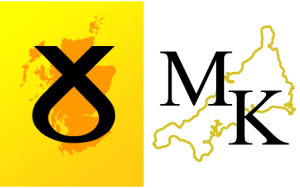 The Greens explicitly want to create an Assembly for Cornwall, with similar powers to the Welsh Assembly. MK goes further, proposing a National Assembly with powers at least equal to the Scottish Parliament in 1998. Curiously, the Con/Lab/Libs sagely tell us that voting for MK would be a wasted vote. But then, they used to say that about the SNP not so long ago.
The Greens explicitly want to create an Assembly for Cornwall, with similar powers to the Welsh Assembly. MK goes further, proposing a National Assembly with powers at least equal to the Scottish Parliament in 1998. Curiously, the Con/Lab/Libs sagely tell us that voting for MK would be a wasted vote. But then, they used to say that about the SNP not so long ago.

May 1, 2015
Dismal election prediction for Cornwall: Coalition landslide
With less than a week to go to the election, the coalition is on course for a stunning victory in Cornwall. A week ago Nick Clegg closed the door on a possible non-Tory agreement by refusing to have anything to do with anyone who might rely on those nasty Scots nats. Then yesterday, Ed Miliband made it crystal clear he’d rather have a Tory Government than any deal with the SNP . Dealing with the separartists would lead to our great country either being smashed into smithereens, losing its great Trident nuclear capacity or ending austerity. And you can’t allow any of that to happen, obviously.
Unless the polls show some sudden movement in the last six days of the campaign, given the numbers Clegg’s only option is to prop up another Tory Government. Labour’s only possibility is equally a grand coalition with the Tories. Cameron must be sleeping soundly. And those investors who sold £1 billion of UK bonds in the past few weeks, because of their fear of Labour’s red in tooth and claw redistributive intentions (if only), should buy them back immediately while they’re going cheap.
This general idiocy and caving in to the politics of fear stirred up by the Tories and their press has effectively made the election outcome in Cornwall utterly meaningless. Whether you vote Tory or Lib Dem, you’re likely to get the same coalition government. Voting next Thursday is just a popularity contest between Tories and Lib Dems. Of course, as the chances of a Lib Dem victory in Camborne-Redruth, South East Cornwall, St Austell or Truro/Falmouth recede into the distance, any residual appeals to ‘tactically’ vote in these seats lose their purchase, even if they had any to begin with. In most of Cornwall the 60-65% of voters (or 75-80% of the registered electors) who don’t want to vote Tory might as well now vote as their conscience, gut feeling or tea leaves dictate.
The election forecasting sites are at present in the main predicting that Andrew George and Dan Rogerson will narrowly squeak home at either end of Cornwall, while the other four seats look safe for the Tories. Only the Electoral Calculus site begs to differ. This predicts a clean sweep for the Tory wing of the coalition. Here’s its predicted results …
Camborne & Redruth
North
South East
St Austell & Newquay
St Ives
Truro & Falmouth
1. Eustice (Con) 33%
1. Mann (Con) 36%
1. Murray (Con) 40%
1. Double (Con) 35%
1. Thomas (Con) 34%
1. Newton (Con) 37%
2. Goldsworthy (LD) 23%
2. Rogerson (LD) 33%
2. Hutty (LD) 24%
2. Gilbert (LD) 28%
2. George (LD) 28%
2. Rix (LD) 26%
3. Foster (Lab) 19%
3. Lingard (Ukip) 17%
3. Monk (Ukip) 18%
3. Mathews (Ukip) 16%
3. Calderwood (Ukip) 18%
3. Hyslop (Ukip) 17%
4. Smith (Ukip) 18%
4. Whitby (Lab) 7%
4. Lloyd (Lab) 10%
4. Hopkins (Lab) 10%
4. Olivier (Lab) 11%
4. Roden (Lab) 13%
5. Garbett (GP) 8%
5. Pennington (GP) 6%
5. Corney (GP) 8%
5. Slade (GP) 7%
5. Andrewes (GP) 9%
5. Westbrook (GP) 8%
6. Jenkin (MK) 0.3%
6. others 0.2%
6. others 0.2%
6. Cole (MK) 4%
6. Simmons (MK) 0.2%
6. others 0.3%
There’s something a bit odd about their extremely sophisticated model, to say the least. It’s a bit like those ONS and DCLG models that insist on forecasting huge rises in Cornwall’s population and household numbers, rises that never actually appear. Electoral Calculus’ s model for example predicts that outside St Austell/Newquay, MK will get around 400 votes in total, down from 3,300 last time. Meanwhile in Truro/Falmouth, MK, the NHAP, the Principles of Politics Party and Independent Loic Rich are set to amass a huge 143 votes between the lot of them, Even the most pessimistic observer of minor parties would hardly rate their chances that poorly.
Could it be a coincidence that the founder of Electoral Calculus, the only forecaster predicting a Tory clean sweep, writes for the Telegraph?

Cornwall and the election 1: the twin crises of affordability and de-Cornishization
Housing is one of the three crises that Cornwall faces, the others being powerlessness and invisibility. Housing impinges on the future of Cornwall in two ways. These are often viewed as somehow separate but in fact are intimately connected. First, a system geared to the market has abysmally failed to provide sufficient affordable houses for Cornish communities. Second, while the market fails to provide affordable homes for local people, it’s highly successful in producing thousands of unnecessary and unaffordable (for locals) houses which then suck in migrants mainly from south east England. The housing market plays a critical role in creating a proliferation of new suburban settlements, most of which result in altering the proportions of the population and de-Cornishizing communities.
There are three simple causes for the affordability crisis in Cornwall. It’s hardly rocket science. The first is the misplaced reliance on a market that doesn’t distinguish between the basic need for a home and investing in an asset. In Cornwall local need has to compete with the attractiveness of investing in property that can be used as holiday or second homes. In 2011 28,957 houses in Cornwall (or 11.2% of the total) had no usual resident and were empty for all or part of the year.
Second, there’s a lack of investment in social housing. In 2013-14 in Cornwall just 10 (ten) social rented houses were added to the stock. This is in line with the third reason for our affordability crisis, the deliberate transfer of responsibility for housing lower income households from the public sector to private landlords. Privatising housing for the poor is part of a mad ideology that deems living in a council house is being unacceptably ‘dependent’ and makes us ‘risk-averse’, but turns a blind eye to the near £10 billion a year of housing benefit paid to landlords or the £5 billion more a year in tax subsidies for those same landlords.
To pursue this project, the Tory/Lib Dem Government came up with a new definition of ‘affordable rented’ houses. These were houses that cost up to 80% of market rent rather than than the 50% more usual for social housing. The new category was designed to ensure that the percentage of so-called ‘affordable’ houses being built could rise, In fact, it hasn’t. The total number of ‘affordable’ houses built, even including this looser definition, actually fell by 29% in England from 2010 to 2014 and by an even higher rate – 32% – in Cornwall.
So what are the political parties proposing to do to turn this around? The Tories aren’t even trying. Having pillaged Cornwall’s social housing stock with Right to Buy, they’re now kicking us in the teeth by proposing to sell off housing association properties as well. In addition they’re offering tax breaks to first time buyers that will effectively put more money in the pockets of those who can save and none in the pockets of those who can’t. Meanwhile, they have the gall to claim that ‘local people will have more control over planning’. This is after removing that control by imposing the extremely developer-friendly ‘National’ Planning Policy Framework (NPPF) on us.
Moving on from the breathtaking capacity of the Tories to proclaim black was in fact white and vice versa, their colleagues the Lib Dems think the main problem is that we’re not building enough houses. So house building has to be speeded up. They’ve already done this, they inaccurately claim, by ‘increasing the number of affordable rented houses’ (not difficult as that category was only invented in 2012), ‘liberalising the planning system’ (by handing it over to developers) and ‘protecting important green spaces’ (so those around Cornish towns can’t be important enough). While Lib Dem policy is naive, disingenuous and dangerous, to say the least, they do suggest local authorities can be given the power to double council tax on second homes.
Labour doesn’t mention even this minor inconvenience for second home owners. This is hardly a surprise when one of their candidates in Cornwall is a multiple home-owner with a holiday home on the Helford. They also say nothing about the National Planning Policy Framework, while buying into the simplistic myth that more houses, rather than a different mix of housing, will of itself solve the problem. On the other hand, they do propose a ‘use it or lose it’ addition to planning permission. This could reduce developers’ land banking but the details are as usual vague and unspecified.
Ukip says nothing about second homes but it does want to bin the NPPF and free local authorities from the housing numbers imposed by central government. But Ukip still relies on the market – higher rents and homelessness are caused by a housing shortage. And that shortage will be reduced by re-directing financial incentives to developers to build on so-called ‘brownfield’ land.
MK and the Greens have the housing policies that might begin to deal with the fundamental problems of affordability and de-Cornishization in our communities. The Greens are stronger on the former; MK on the latter. Green policies include scrapping Right to Buy and Help to Buy, a massive increase in the budget for social housing, regulation of the private rented sector and redefining affordable housing to reflect local median wages rather than inflated market rents.
However, they say nothing about second homes. MK do. They want to halt and reverse the spread of second homes through additional local taxes on properties with no permanent occupant. They also want a Cornish National Planning Policy Framework and the devolution of powers over planning so that speculative building to meet external demand can be curbed and more social housing built instead.

April 30, 2015
Is the free press doing its duty and making Britain safe for the Tories?
As the election ritual stutters on to its consummation in the bonfire of ballots in a week’s time, let’s check that the corporate press is doing its duty. How many headlines has each party got per candidate over the last month? (The source is the Nexis news database)
The SNP are so far out in front as to be almost out of sight. Of course, most of the headlines outside Scotland are not exactly complimentary. More like scaremongering, hysterical or just plain daft. The headlines for Labour, given the way the media has pounced on Ed Milibland’s meeting with Russell Brand, the spawn of Satan, are no doubt similarly negative. But, on the adage that there’s no such thing as bad publicity, Labour are holding up well in the corporate media.
Ukip are doing slightly better than the Lib Dems, who these days are not of much interest to corporate journalists or anyone else (which may explain increasingly desperate Lib Dem leaks). Plaid do better than both of these parties, given their candidate numbers. Even MK’s ten ‘headlines’ give them a better rating. But here we must note a small problem with using this measure. All the 10 MK ‘headlines’ were in fact topping opinion pieces invited from the candidates by the local press. Not one was a story about the party as opposed to a political policy position from the party. These ‘candidate pieces’ make up only a very small proportion of other parties’ headlines.
Why no Greens in the chart? Because the search facility in the Nexis database doesn’t allow an easy distinguishing between the political party and village greens, golf greens or even green tea.
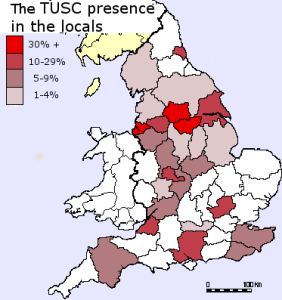 When it comes to alternative socialist voices, TUSC, who have arguably produced one of the liveliest party political broadcasts, has only managed to generate eight headlines, despite having 133 candidates. That’s 0.06 per candidate, compared with around 4 for the Westminster austerity cheerleaders. So good to know our corporate press can still do its job and report these rituals fully and fairly, isn’t it.
When it comes to alternative socialist voices, TUSC, who have arguably produced one of the liveliest party political broadcasts, has only managed to generate eight headlines, despite having 133 candidates. That’s 0.06 per candidate, compared with around 4 for the Westminster austerity cheerleaders. So good to know our corporate press can still do its job and report these rituals fully and fairly, isn’t it.

April 29, 2015
The geography of Green-ness
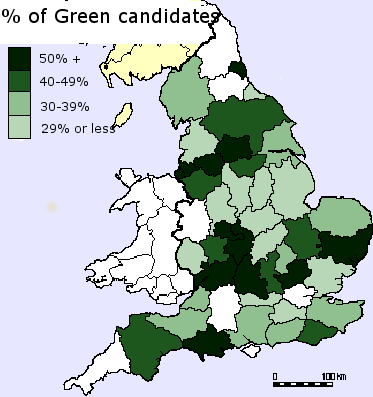 If the pattern of nominations in the local elections this year suggests that Ukip may be on the brink of transformation into a south east English regionalist party, what does the geography of Green Party candidates tell us?
If the pattern of nominations in the local elections this year suggests that Ukip may be on the brink of transformation into a south east English regionalist party, what does the geography of Green Party candidates tell us?
There is one overlap with Ukip, in that the local councils where Greens are most active are the metropolitan boroughs of the West Midlands, Merseyside, Greater Manchester and West Yorkshire. To some extent this is a result of the electoral set-up. All the wards in those councils return one councillor every year, rather than three councillors every four years. In many rural district councils two and three seat wards allow a party to put forward just one candidate and still have a presence even though contesting only a third of the seats. And annual elections may also stimulate better party organisation and more member involvement.
The Greens’ other area of strength lies in a belt across middle England, from Gloucestershire in the west, through Oxfordshire to Suffolk in the east, with outliers of greater activity in Devon and Dorset in the south-west and East Sussex in the south-east. What is noticeable in these local election nominations is that in many south-western rural wards there’s a straight fight between Tories and Greens, as the Liberal Democrat presence fades.
Indeed, the Greens have managed to put up more candidates than have the Lib Dems in all the metropolitan boroughs and in several rural counties, as the map below indicates. With the exception of Suffolk, these areas are in the more peripheral west and north of England.

Bernard Deacon's Blog
- Bernard Deacon's profile
- 3 followers



